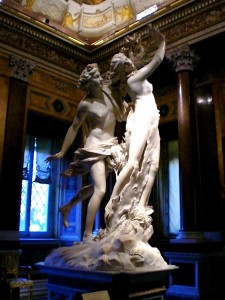Bernini’s Apollo and Daphne statue group in the Galleria Borghese in Rome – can I get away with giving that as my preferred translation? Notice the desperation of Daphne’s flight, how Apollo can still feel her heart beating under the light new covering of bark, how the toes are becoming roots and the hair becoming leaves. And the expression on her face shows that she is still trying to avoid his kisses (line 556).
I particularly like the ‘embracing’ word-order of line 555, which even begins with the word ‘complexus’.
I have provided a translation but I think Bernini says it better!
Anne Dicks
plura locuturum timido Peneia cursu 525
fugit cumque ipso verba inperfecta reliquit,
tum quoque visa decens. Nudabant corpora venti,
obviaque adversas vibrabant flamina vestes,
et levis inpulsos retro dabat aura capillos,
auctaque forma fuga est. Sed enim non sustinet ultra 530
perdere blanditias iuvenis deus, utque monebat
ipse Amor, admisso sequitur vestigia passu.
Ut canis in vacuo leporem cum Gallicus arvo
vidit, et hic praedam pedibus petit, ille salutem:
alter inhaesuro similis iam iamque tenere 535
sperat et extento stringit vestigia rostro,
alter in ambiguo est, an sit conprensus, et ipsis
morsibus eripitur tangentiaque ora relinquit:
sic deus et virgo est hic spe celer, illa timore.
Qui tamen insequitur pennis adiutus Amoris, 540
ocior est requiemque negat tergoque fugacis
inminet et crinem sparsum cervicibus adflat.
Viribus absumptis expalluit illa citaeque
victa labore fugae spectans Peneidas undas
“fer pater” inquit “opem si flumina numen habetis. 545
Qua nimium placui, mutando perde figuram!”
Vix prece finita torpor gravis occupat artus:
mollia cinguntur tenui praecordia libro,
in frondem crines, in ramos bracchia crescunt,
pes modo tam velox pigris radicibus haeret, 550
ora cacumen habet; remanet nitor unus in illa.
Hanc quoque Phoebus amat, positaque in stipite dextra
sentit adhuc trepidare novo sub cortice pectus
conplexusque suis ramos, ut membra, lacertis
oscula dat ligno: refugit tamen oscula lignum. 555
Cui deus “at quoniam coniunx mea non potes esse,
arbor eris certe” dixit “mea.
Vix prece finita torpor gravis occupat artus:
mollia cinguntur tenui praecordia libro,
in frondem crines, in ramos bracchia crescunt,
pes modo tam velox pigris radicibus haeret, 550
ora cacumen habet; remanet nitor unus in illa.
Hanc quoque Phoebus amat, positaque in stipite dextra
sentit adhuc trepidare novo sub cortice pectus
conplexusque suis ramos, ut membra, lacertis
oscula dat ligno: refugit tamen oscula lignum. 555
Cui deus “at quoniam coniunx mea non potes esse,
arbor eris certe” dixit “mea.
Peneian Daphne escaped from him in her timid flight – he was about to say more – and left him along with his unfinished speech, even then appearing beautiful: the winds were uncovering her body and the breeze in her path blew against her dress. The gentle breeze made her moving hair undulate behind her and her figure was emphasised by her flight.
The youthful god could not bear to waste his endearments any more, and as the god of Love himself was urging him on, he followed behind with quickened pace.
Just as when a greyhound has seen a hare in a clear field and the one seeks prey with his feet while the other seeks safety; one as if about to make contact hopes at any moment he will get her and extends his steps with muzzle stretched out. The other doesn’t know whether she has been caught, and pulls herself from the very jaws and moves away from the mouth touching her. So were the god and the girl: one speedy with hope and the other from fear.
The one following, however, helped by the wings of Love, was faster, and denied her any space and was there behind her as she fled and his breath moved the hair lying on her neck. With her strength used up she grew pale and, conquered by the effort of her flight, she gazed at her father Peneius’ river and said: “Father, bring me help! If you rivers have divine power, destroy by changing it the beauty which has caused me to be too much admired!” Scarcely had she completed her prayer when a slow languor possessed her limbs. Her soft heart was encased in tender bark. Her hair grew into leaves, her arms into branches. Her foot – recently so swift – was held fast with immovable roots. Her face became a tree-top: it remained her one beauty.
This tree still retained Apollo’s love. Placing his hand on the trunk he felt her heart still fluttering under its new bark. Embracing the branches as if they were limbs, with his own arms he gave kisses to the wood: the wood however shrank back from the kisses.
To this tree the god declared: “Even if you cannot be my wife you will definitely be my tree!”
Chosen and translated by Anne Dicks, Classics teacher.
The above text is provided by the Perseus Digital Library.


No Comments